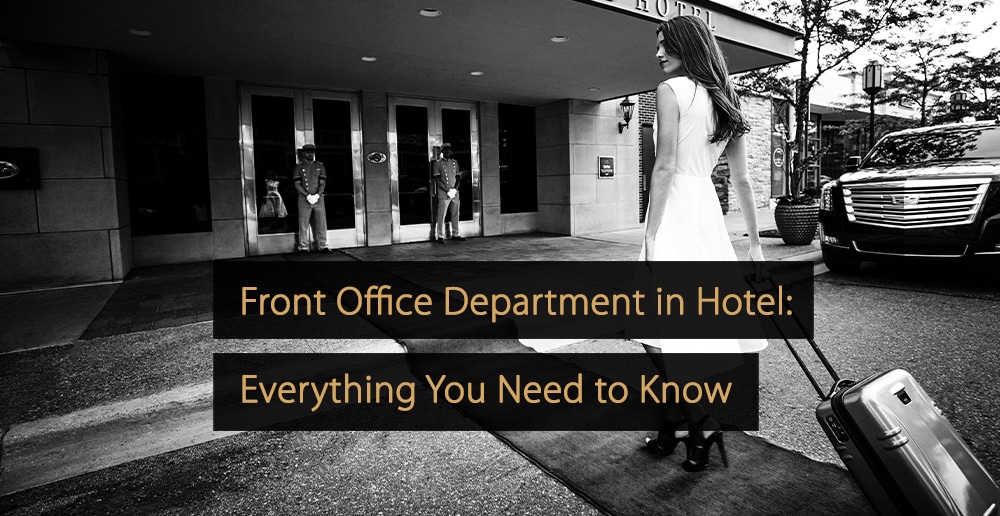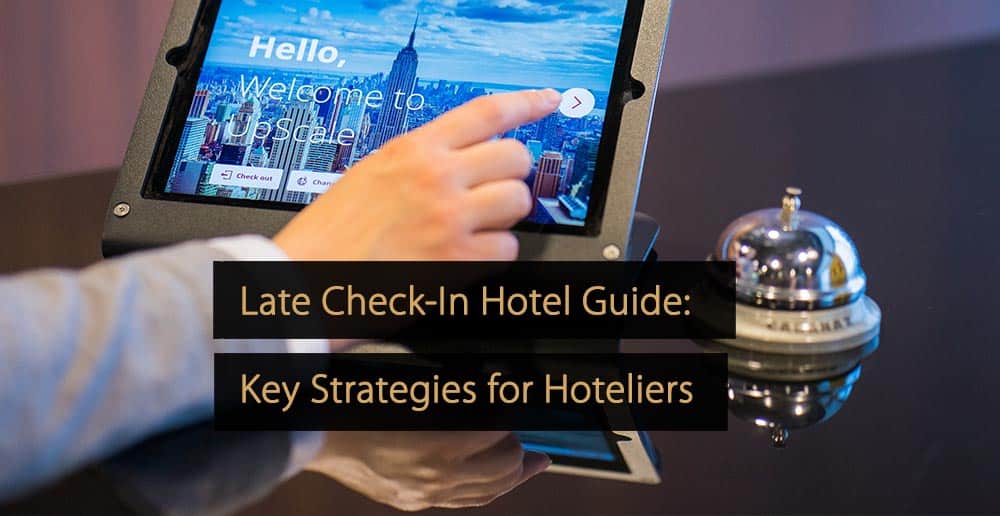The front office department in a hotel is at the core of the entire operation. The primary functions of the front office include reservations, checking in and out, handling of financial transactions (such as settling accounts or providing currency exchange), fielding customer inquiries, arranging guest services, and more. In this article, you’ll learn everything about the nerve center of a hotel.
Table of Contents:
- Understanding the Front Office Department in a Hotel
- Significance of The Front Office Department in a Hotel
- Main Responsibilities of a Front Office Employee
- 8 Functional Management Roles of the Front Office Department in a Hotel
- What Is Required of a Front Office Employee?
- 3 Tips to Run Your Front Office Department Smoothly
- Importance of the Front Office Department Software Technology
- Hotel Management Software Solutions
- Hotel Career Tips For Your Future
- The Booking Extranet
Understanding the Front Office Department in a Hotel
The front office department plays a crucial role in the success of the business, as it is the first point of contact for your customers and the main point of contact while they stay with you. All your guests will interact with your front office department. They will book reservations through the front desk and then check in when they arrive. If they have problems or queries, the front office is the department that will deal with them. They will interact with the front office again when they check out and leave. The front office will also assign their rooms and keep the room status updated.
The hospitality industry is a big and rapidly growing industry – according to the Hotel And Other Travel Accommodation Global Market Opportunities And Strategies Report by Research and Markets, the global hotel and other travel accommodation market is to grow to $1,453.44 billion by 2031.
As well as handling payments for accommodation and services, the front office of a hotel with many international guests might also handle foreign exchange transactions. Another important role the front office department performs is creating and maintaining records containing guest information. This is increasingly important in tracking patterns in the market and tailoring hotel marketing to future and existing guests.
Video: What Is the Front Office Department in a Hotel?
Significance of The Front Office Department in a Hotel
The front office department of the hotel has a special responsibility when it comes to creating the ideal guest experience. It is often seen as the hotel’s face. Performing smooth check-ins, handling queries in a prompt and helpful manner, and responding speedily to resolve any problems will all go a long way to making a guest’s experience more enjoyable and positive.
As you can see, your front office department plays a key role in creating a good impression. Hotel trends might change, but a hotel’s front office must always maintain smooth and friendly interactions with customers.
Main Responsibilities of a Front Office Employee
The front office department in hotels has many duties on a daily basis. However, it is essential to understand the main responsibilities of the employees to understand how the department functions. Below are three key duties of a front-office employee.
Planning Guest Experience
The clerks at the front desk play a very important role in presenting the hotel in its best light. They have continuous contact with the hotel’s guests throughout the working day. A clerk’s duties involve checking guests in and out and handling room payments and payments for services, food, and other items.
It’s important that all these processes are handled smoothly. A front office clerk’s duties extend to other aspects of the guest experience: recommending local attractions, helping guests plan trips and activities, and making guests aware of the hotel’s services and any activities offered on-site.
Accommodating Guest Requests
Guests may make various requests during their stay, which will be handled by the front desk. They may need additional linen or toiletries or wish to learn how to operate systems such as heating, air conditioning, or entertainment systems. Guests may also need to report issues with their rooms, such as items that don’t work properly or soiled items.
Front office staff may be able to take care of some of these themselves. In most cases, the front office will need to interact with other departments. For example, they might need to get in touch with housekeeping or speak to maintenance, then follow up.
Secretarial Duties
Front office department staff will also perform a range of secretarial and clerical duties. These include preparing spreadsheets, drafting letters, memos, and other correspondence, and preparing presentations. They may also perform tasks such as making travel arrangements for senior team members or managing their calendars.
Front desk personnel are often tasked with photocopying documents, filing, handling correspondence via email or fax, and ordering stationery and other office supplies. For smaller hotels, front office staff may also handle some of the smaller accounting tasks, particularly those that relate to the department’s finances and expenses.
8 Functional Management Roles of the Front Office Department in a Hotel
The front office department in a hotel has eight main management roles. Sometimes these are handled by the general front office staff rather than dedicated personnel, especially in smaller hotels.
Front Office Manager
A front office manager’s role is to oversee the front desk staff. They are also tasked with ensuring a quality experience for every guest. Front office managers will prepare schedules to ensure full staffing at the front desk at all times. They may be involved in the hiring and training of new staff.
Guest Service Manager
A separate guest service manager may oversee the front office staff in some hotels, particularly larger establishments. This position may involve scheduling, staff training and development, managing the departmental budget, and maintaining good working relationships with the hotel’s other departments.
Reservation Manager
The reservation manager’s job is to handle reservation services, maximizing efficiency in the front office department in the hotel. As well as dealing with cancellations and changes, the reservations manager will be tasked with ensuring that front desk staff are prepared to answer guests’ questions. They may also coordinate with the sales and housekeeping departments.
Reception Manager
The reception manager will be the first point of contact for guests arriving at the hotel. It’s their job to make guests welcome and ensure their comfort and satisfaction during their stay. Reception managers ensure that reception areas operate smoothly and efficiently. They may also oversee a reception team.
Revenue Manager
The revenue manager is tasked with ensuring that guests are charged at the appropriate room rate. They will also be responsible for periodically reviewing room rates and service charges, comparing them to other hotels in the area within a similar price bracket, and ensuring that rates remain competitive.
Night Audit Manager
In the evenings, the night audit manager is tasked with supervising auditing processes. These are in place to make sure that all of the day’s financial transactions are properly accounted for and fully reconciled. They will make sure that all cash taken that day is counted and will check for any discrepancies.
Concierge
The concierge is responsible for running the front desk. A concierge will coordinate with various hotel departments to ensure guests’ needs are met. The concierge may also be involved with staffing the front desk, ensuring that there’s always someone on hand to assist guests.
Housekeeping Manager
The housekeeping manager oversees the housekeeping staff. They are responsible for cleaning and sanitizing rooms to prepare everything for the next guest. They will also perform housekeeping tasks in the public areas in and around the hotel: cleaning bathrooms, vacuuming carpeted areas, etc.
What Is Required of a Front Office Employee?
Hotel management will look for several key qualities in front desk employees. A friendly, hospitable demeanor is one of the more obvious traits. Perhaps more important are abilities like multitasking, remaining calm under pressure, and the ability to cope with long hours without flagging. Front desk employees also need a wealth of tact and consideration, as they may be called upon to handle delicate situations with diplomacy.
Conflict resolution is a vital skill, as is the ability to balance the guest’s needs with the hotel’s best interests. Tact and diplomacy involve striving to understand people, to empathize with their needs and feelings. It’s not enough to simply be a people-pleaser, which can result in over-promising. Staff working in the front office department of a hotel must always be able to approach guests with courtesy, professionalism, and integrity.
Table: Key Requirements of a Front Office Employee
| Key Requirements | Description | Examples of Tasks and Responsibilities |
|---|---|---|
| Customer Service | Provide excellent service, welcome guests, address inquiries and resolve issues professionally. | – Greet guests warmly upon arrival. – Assist with check-in and check-out. – Respond to guest requests and resolve complaints. |
| Efficient Operations | Manage reception duties, check-in/out, administrative tasks, and multitask for a seamless guest experience. | – Handle reservations and room assignments. – Maintain accurate guest records. – Process payments and invoices efficiently. |
| Effective Communication | Possess strong communication skills to interact with guests and colleagues and promote hotel services. | – Communicate clearly and courteously with guests. – Collaborate with housekeeping for room readiness. – Promote amenities, upselling when appropriate. |
3 Tips to Run Your Front Office Department Smoothly
You can employ certain strategies to ensure your guests get the full experience of your hotel. The front office is an essential part of their stay, therefore, you can ensure the department is providing all information possible. Here are our tips for exceeding your guests’ expectations.
1. Bring Local Knowledge to Your Guests
When guests come to a hotel, they are usually in an unfamiliar area. While guidebooks and tourist information can be helpful, they’re no substitute for genuine local knowledge. Every team member working in the front office department should be equipped with sufficient local knowledge to assist guests with questions about the local area.
They should be able to recommend restaurants, the best shopping, how to find local attractions and events, and what leisure activities are available. Creating a unique tourist guide for your guests is a good way to pass along suggestions. Hotels can also offer coupons and discounts and offer to handle bookings for their guests.
2. Make Sure You Train Your Staff Continuously
Staff training and development should be an ongoing process. Staff will need to be prepared for a range of eventualities, and regular training will give them the tools they need. Ongoing training and support create empowered staff members with the know-how and confidence to respond professionally and effectively to all events and challenges.
You will need a defined plan to train your staff on their core skills and additional capabilities, such as communication and time management. The front desk should have an operations manual that details roles and best practices.
3. Know Your Guests & Plan For Their Wishes
Getting to know your guests allows you to create excellent guest experiences. As well as noting the preferences of current guests, you should make an effort to track the preferences of repeat customers. It’s useful to know if they have a specific room they prefer or small details such as wanting an extra blanket or a pillow.
It can also be helpful to learn small facts about the guests themselves, such as their profession and names of family or pets. A hotel PMS (property management system) allows you to store detailed information on each guest and offer a welcome with a personal touch.
Importance of the Front Office Department Software Technology
Hotel technology is increasingly sophisticated nowadays and offers a range of advantages. Advanced technology is now indispensable for managing modern hotels. Software systems can streamline all kinds of functions, from handling incoming reservations to guest communication and tackling multiple distribution channels.
Without adequate software support, the operation of a hotel is unwieldy, and errors are likely to occur. Front office technology allows you to automate many common tasks associated with booking processing. A housekeeping app, digital concierge, or other platforms also allows you to read messages from staff and guests in a single location.
For more information, read “Front Office Technology: The Latest Tech for the Reception Department.”
Hotel Management Software Solutions
Software solutions for hotels are absolutely vital in the modern hotel industry. Many hotels today make use of a range of software solutions to facilitate tasks such as handling bookings, review management, revenue management, and tracking housekeeping. From PMS software to reputation management, technological solutions are available for almost all of the challenges a hotel business may face.
As hotel trends move towards the wider adoption of technology, it’s more important than ever to be aware of the tools that exist to facilitate hotel operations. In “Hotel Management Software Solutions Every Hotel Needs”, you’ll learn about some of the most important categories of hotel software.
Hotel Career Tips For Your Future
You’ll need some inside information if you’re just starting out in an entry-level position or looking to develop your existing hotel career. Working in the hotel industry offers many varied and rewarding possibilities for those who are willing to work hard and develop their skills.
The industry is a competitive one, and the right knowledge can help a great deal. In “Valuable Tips to Manage Your Hotel Career”, you’ll learn vital tips and tricks to get ahead in the industry. You’ll learn about the training you’ll need and the approaches to help you succeed.
The Booking Extranet
Booking.com is one of the biggest and most widely used online travel agencies globally. According to the Estimated Total Number of Visits to the Travel and Tourism Website Booking.com Worldwide Report by Statista, in January 2024, there were 565.2 million website visits. Its management platform, the Booking Extranet, lets people in hotel management roles oversee reservations and manage other aspects of their listing on the Booking.com site. Properly using the Booking Extranet can help boost reservations and increase your hotel’s revenue.
In “Booking Extranet: 10 Strategies to Increase Your Revenue on Booking.com”, you’ll discover key methods and strategies for creating and managing a listing that will get your hotel noticed and how you can use the system to make your job easier.
Front Office Department in Hotel FAQs
The hotel’s front office department is crucial to providing the ideal guest experience and handling important data like guest information and room statuses. Proper organization, staffing, and training are vital for its smooth operation, as is implementing the right hotel technology.
Did You Like This Article About the Front Office Department in Hotel?
You might also be interested in the following articles:
- Housekeeping Department in Hotel Businesses: Why Is It So Important?
- Hotel Departments: Learn About All the Sections of a Hotel
- PMS System: What Are the Most Important Features?
- Hotel Night Auditor: How Technology is Changing the Role in Hotels
- Hotel Front Desk Software: What Is It, Main Features & Examples
More Tips to Grow Your Business
Revfine.com is the leading knowledge platform for the hospitality and travel industry. Professionals use our insights, strategies, and actionable tips to get inspired, optimize revenue, innovate processes, and improve customer experience.Explore expert advice on management, marketing, revenue management, operations, software, and technology in our dedicated Hotel, Hospitality, and Travel & Tourism categories.
This article is written by:
Hi, I am Martijn Barten, founder of Revfine.com. With 20 years of experience in the hospitality industry, I specialize in optimizing revenue by combining revenue management with marketing strategies. I have successfully developed, implemented, and managed revenue management and marketing strategies for individual properties and multi-property portfolios.











Beautifully written article and very informative.
This is a very informative article about front offices in hotels. Who is the author? For my reference, please.
The Revfine.com team has written the article. All articles are updated on a regular base.